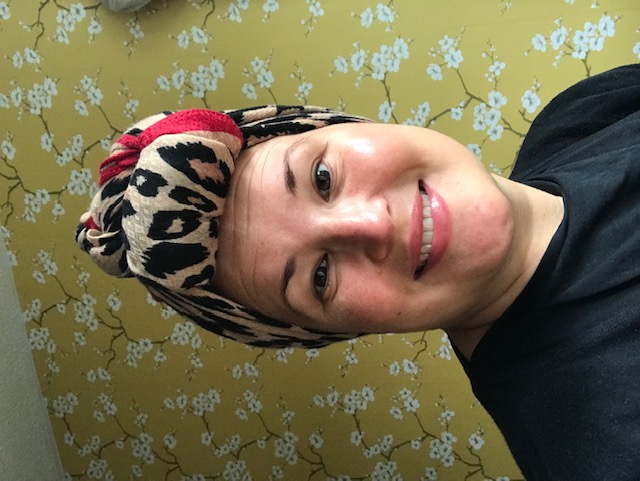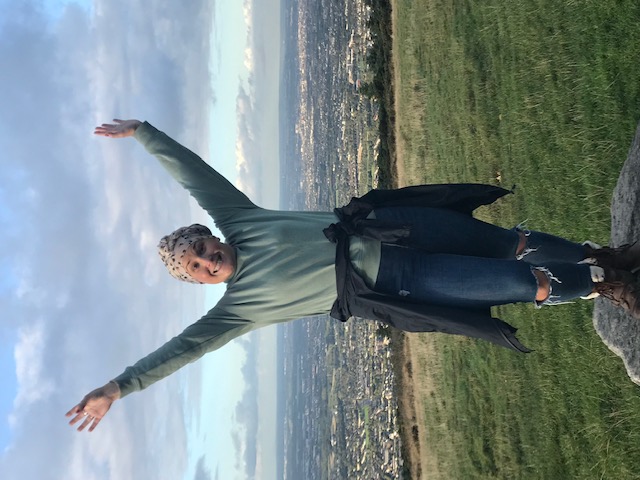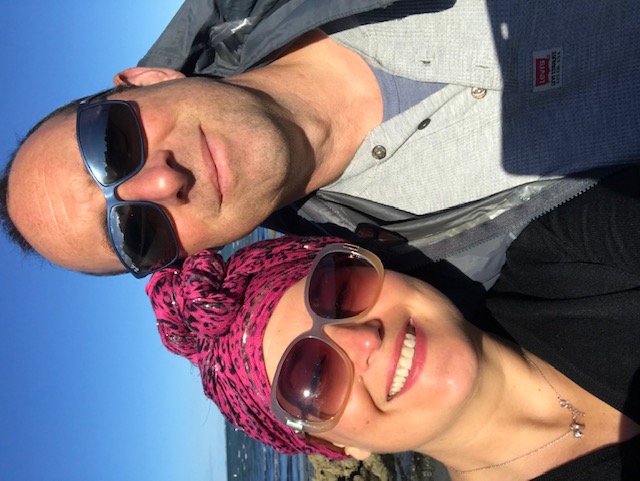Breast Cancer: “ Normal will exist, it’ll just be a new form of normal.”
Published 19 Oct 2022 • By Lizzi Bollinger
Hayley was heartbroken to find out she was suffering from cancer but that did not break her resolve as she not only beat cancer but also empowers other cancer victims through her social media channel. Read on to discover how cancer changed her outlook on life and shaped her relationship with herself.

Hello Hayley, thank you for agreeing to share your story with us on Carenity!
First of all, could you tell us more about yourself ?
My name is Hayley and I turned 40 in February 2022. I am the mother of 3 children, 2 sons aged 20 and 17 and a daughter aged 16. I am married to my wonderful husband, Killian who is my rock and my constant support, and we live in Dublin, Ireland. I am originally from Dorset, England but moved to Dublin 7 years ago. I am a genealogist, specialising in probate, a job which I adore and I would regularly do genealogy as a hobby also. In my spare time I also enjoy painting, crocheting and walking anywhere that is near water and spending time with my family.

Could you tell us when you were diagnosed with breast cancer? What alerted/prompted you to consult a doctor? What type of tests did the doctor run? How did you feel when you were diagnosed?
I was diagnosed with breast cancer in May 2022. I attended my doctor in April 2022 with a lump under my left arm that I had recently noticed. My doctor thought this was nothing to be concerned about but referred me to my breast care clinic for further checks to be sure. I attended the breast care clinic at the beginning of May where I was checked, again, the doctor thought the same as my own GP but decided to refer me for a mammogram that day and an ultrasound at a later date just to be safe. After the mammogram I received a call asking me to go back 2 days later for further mammograms and an ultrasound. While I was at the appointment I was told that the lump under my arm was clear but the mammogram had picked up something in my left breast and a biopsy was performed also. I went back 12 days later where I was told I had breast cancer, just hearing those words had me breaking down in tears. I was extremely grateful that my husband was with me and that he was able to take in some of what the doctor was telling us as the whole experience was a blur.
What type of breast cancer do you have? What distinguishes this type of cancer from others?
I was diagnosed with invasive ductal carcinoma, ER positive, PR positive, HER negative. At initial diagnosis before any other tests were conducted it was believed to be stage 1 or 2 as they initially through that it was over 50mm. After my surgery it was found to be stage 1, having not spread to any other parts of my body and my lymph nodes were also clear of cancer. The tumor was also found to be 45mm but only 17mm was cancerous, the remainder was pre cancerous cells. However, the tumor was found to be grade 3, the most aggressive so my sample was sent to the US for an Oncotype DX test which would give a figure of potential recurrence within 9 years with or without chemotherapy. Mine came back with 24% chance of recurrence within 9 years without chemotherapy which would be reduced by at least 15% to under 9% potential recurrence with chemotherapy.
What treatment did you receive? Were you satisfied with it? Did you experience any side effects?
My initial treatment was a unilateral left mastectomy which was performed in June 2022. I had surgery on the Thursday and was discharged on the Saturday. Recovery went well and physiotherapy was successful. I was tired for a long period after my surgery. Two weeks after my surgery I was told that it was successful, I had clear margins and my lymph nodes were also clear meaning I was cancer free. Hearing those words was the best feeling, I was absolutely overjoyed. However, due to my Oncotype DX score it was suggested that I have chemotherapy as a precautionary and preventative measure and it was agreed that I would have TC chemotherapy - Taxotere (Docetaxel) and Cyclophosphamide. This would be 4 cycles, one every 3 weeks, 12 weeks in total. I have just had my third dose so will have my final dose mid October. I have had a number of side effects from the chemotherapy but had also handled it fairly well. I find that the week following the chemotherapy it really hard and I spend a lot of time sleeping or just resting as my energy levels are very low. My mouth and tongue and usually quite horrid also, but not really sore, just a nasty taste and very dry with loss of sense of taste. I have been very fatigued and find that most days I need to take naps even when I haven’t been doing anything strenuous. More recently I have been having hot flushes at night with are affecting my sleep.
You are active on social networks under the handle @forty_fighting_breast_cancer. Was this the case before? Why did you decide to talk about your battle with cancer on social networks? How does sharing your story make you feel?
I had a personal instagram account before I was diagnosed with breast cancer but I set up @forty_fighting_breast_cancer after my surgery. I felt a needed to tell my story as a way of raising awareness. I was only 40 when I was diagnosed and I felt that many people assume that cancer is an older persons issue and that it wont affect them. I didn’t expect to be told I had cancer at 40 but thankfully I did check my breasts and this meant that my cancer was detected relatively early. I felt it was important to raise awareness with other people, including my close friends and family. Since starting to share my story I have also found that I have gained a lot myself from being so open. The community I have connected to are incredible and there is so much support offered. Often unless people have experienced a cancer diagnosis it is hard for them to understand exactly how it feels and so it is comforting to talk to others who are going through or have been through the same. They are often able to offer advice on many things and it is comforting to have a network of people you can rely on. I only hope that I can help and offer people at the beginning of their journey the same advice and support that has been offered to me.

Would you say cancer has changed your outlook on life? If so, in what ways?
Yes, I believe cancer has changed my outlook on life. I have always been a bit of a procrastinator, its been a running joke between myself and my husband, but now I feel like there is no time for that, I need to grab life by the horns and experience everything I can, while I can. I have spent time writing my ‘Living List’, a list of all the things I'd like to do, places I want to go and things I want to experience, even if they may be outside my comfort zone. If anything were to change I don’t want to look back and think what if or I wish I’d done x, y and z, when its too late to do them. Cancer has given me a wake up call. I’d also say it has allowed me to be a little more confident, I would have been someone who was worried about saying no to people or nervous to open my mouth to injustice within my own life. I believe this has changed and I feel more in control of my own life for the first time in many years, it's very liberating.
Cancer and cancer treatments can cause big physical changes. Did you need to adjust to a new appearance? What tips and tricks do you use to feel more feminine?
Yes, I think I am still adjusting to my new appearance. I had a left mastectomy without reconstruction as my consultant wanted to wait until after surgery to see what other treatment I might need. I will be meeting with my consultant again in January 2023 to discuss reconstruction options but at this stage I am still very unsure as to how I will proceed. I have done some reading on reconstruction but I need to do more to informed myself better before making any decision. I use a prosthetic at the moment and no one would know any different when I am out if they don’t already know my story.
After my first chemotherapy session my hair started coming out a lot both when brushing and in the shower so on day 11 I made the decision to shave my head to a blade 4. My husband shaved it for me and it was a very emotional time but also very liberating. I had decided from the outset that I was not going to let cancer take my hair and I was going to take control and take it myself. Very soon after that when I was seeing more patches and shaved it again to a blade 1 and the majority came out very soon after but at that point I was ready and I felt strong about it.
Some wonderful ladies on Instagram sent me some scarves and hats for free which was incredibly kind and I also bought a number of wigs to use. I thought before I lost my hair that I would wear wigs all the time, perhaps I subconsciously thought if I was wearing wigs that no one would know what I was going through, but I have actually found that I am enjoying and embracing wearing scarves more. I like the variety of them and I don’t feel nearly as self conscious or concerned about what other people think as I thought I would. I have embraced the new look and I am enjoying doing so.
I have never been someone who wears makeup but recently I have started just wearing a small amount to perk me up and to give me a little glow. It helps me feel more feminine despite having lost some elements of myself that are considered to be more feminine. Even just a splash of lipstick and some earrings make me feel more bright and happy.
Have you had to adapt your lifestyle? If yes, in what ways?
Yes, since my surgery in June and then with my chemotherapy that started in August I haven’t been working since June. My work have been incredible and so supportive while I am going through this time which has made the process much easier as it has been one less stress. I am very much looking forward to my chemotherapy being over and getting back to the job I love, which may begin on a part time basis but I will take each day as it comes in relation to how I am feeling and recovering.
My diet has always been relatively good, especially since last year when I was diagnosed with gallstones, having my gallbladder removed in October 2021. I lost over 2 stone during that time by cutting fats out of my diet and I had felt much healthier since then. Since my diagnosis I have considered other elements of my diet and once I started chemotherapy I stopped drinking alcohol. I wouldn’t say that I had a problem with alcohol but with the luxury of hindsight I can look back and say my relationship with alcohol was not always healthy. I will not drink while I am going through the chemotherapy and I will consider where I go from there once treatment is done. At this stage I have no interest or inclination to drink but I will consider all of this going forward. I’d like to think that I can give up drinking or at least have a healthier relationship with it.
In relation to sleep, the chemotherapy has brought on hot flushes which began about 3 weeks after my first dose. I find myself waking every 2 or 3 hours with a hot flush that gradually creeps up my body until I am burning hot and sweating and fighting to be in contact with any small cold patch in the bed in the hope it helps me cool. I have recently bought some gel cooling pads for my pillows, they help keep my head cool but sadly the rest of my body is still burning. It is something I will discuss with my oncologist as I know that after I finish chemotherapy that I will be taking tamoxifen for at least 5 or potentially 10 years to suppress my hormones. This is because my breast cancer was hormone positive. The tamoxifen will essentially put me in to an early menopause so I will deal with more hot flushes and other symptoms, but that is for further down the line.
Did your loved ones support you? Was it easy for you to talk about the disease to those around you?
I have had so much support from my friends and family and I am so grateful to each and every one of them for every thing they have done for me during this difficult time in my life. At the beginning of this journey when I was first diagnosed I chose not to tell my children straight away. My daughter had school exams coming up and I knew very little about what my cancer journey would entail, only that I have been diagnosed with breast cancer. I felt it more prudent to wait until my daughters exams were over, at which point I would have undergone more tests and scans and I would have more answers for my children regarding the process. I did tell close friends and family when I was diagnosed. It was hard to tell people as my own emotions were all over the place and people wanted to be in touch to offer support but I often felt I wasn’t able to interact. But everyone was very understanding and supportive and had no expectations.

Finally, what advice would you give to Carenity members also affected by breast cancer?
Be careful what you read when you are first diagnosed, you will find lots of information online and a lot of it will not relate to you and your situation, every journey is so different and the internet will send you down large rabbit holes of unrelated information. You will only scare yourself and convince yourself of the worse case scenarios, even though they are unlikely to relate to your very specific situation. My breast care nurse gave me a booklet when I was diagnosed but she folded a page and told me not to read past that page as 90% of the information would not relate to me. I was very grateful for that.
If you have a supportive and caring medical team then reach out to them with any questions or concerns you may have. I was lucky to have a wonderful team of breast care nurses who were incredibly supportive and approachable and made the whole process easier, they were able to answer what may have seemed like the most ridiculous questions to me and nothing was ever a bother or too much trouble.
I would also suggest connecting to a community who can offer you support and guidance. I joined Instagram almost 2 months after my diagnosis. I had taken a look at it before this and before I knew what my own journey might entail but like with searching the internet I found myself reading stories of others and scaring myself before I really knew what I would experience. I did join once I knew more and I felt ready and aware of what I would be going through personally and it has helped me immensely. I have met some wonderful people who are going through the same as me or have been through it already and some of those people have become good friends who I would rely on for support and whom I hope know they can rely on me too. If Instagram isn’t your thing then there are support groups or chat pages on some of the larger charity pages such as Macmillan Cancer Support in the UK which are great for answering any questions you may have.
Any last thoughts?
Know that you are not alone in this. When you are first diagnosed you will feel very alone and like the weight of the world is on your shoulders. Know that while it seems that way it will become easier and you will move through this. Reach out to people, write down your thoughts, spend time alone, spend time with people. Do whatever you need to do to come to terms with this unexpected and life changing news. But know that this diagnosis will not break you and it will not define you. It may change you and your own outlook and the normal you have known may never be the same normal again.
Many thanks to Hayley for sharing her story with us on Carenity!
Was this testimonial helpful to you?
Give it a like and share your thoughts and questions with the community in the comments below!
Take care!

 Facebook
Facebook Twitter
Twitter

